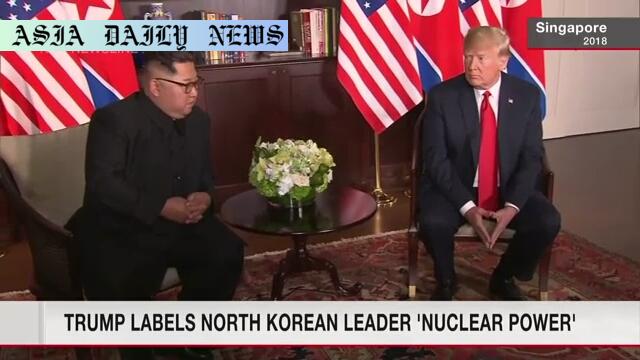President Trump refers to Kim Jong Un as a ‘nuclear power’ during White House comments.
- President Trump referred to Kim Jong Un as a ‘nuclear power’.
- Trump highlighted his positive relationship with Kim.
- The US does not formally recognize North Korea as a nuclear power.

President Trump Comments on Kim Jong Un
In a recent statement from the White House, US President Donald Trump made intriguing comments about North Korean leader Kim Jong Un. Speaking about their interactions, Trump referred to Kim as a ‘nuclear power,’ a phrase that quickly sparked international discussions. While his remarks emphasized their seemingly positive relationship, they have drawn attention due to their potential diplomatic implications.
Trump elaborated on his rapport with the North Korean leader, saying, ‘We got along very well.’ He further added, ‘I think he will be happy to see me coming back,’ a statement that suggests Trump believes in the potential for continued diplomacy. Even as North Korea’s nuclear capabilities have been widely acknowledged, the US government has refrained from formally recognizing it as a nuclear power under international treaties and accords.
The Significance of Trump’s Wording
The terminology used by Trump marks a departure from the established narrative used by prior administrations. While it is true that North Korea has advanced its nuclear weapons program significantly over the years, calling Kim Jong Un a ‘nuclear power’ is a rhetorical choice that may be seen as legitimizing North Korea’s nuclear capabilities. This particular stance may influence ongoing efforts to curb nuclear proliferation in the Korean Peninsula and beyond.
By choosing such words during an official White House address, Trump has perhaps signaled a recognition of the complexities inherent in US-North Korea relations. At the same time, these remarks could complicate future efforts by the international community to isolate North Korea’s nuclear ambitions. Diplomats and analysts are likely to scrutinize these comments further in the coming days.
The Current State of US-North Korea Relations
The relationship between the United States and North Korea has historically been fraught with tension, marked by conflicting objectives related to nuclear disarmament and economic sanctions. During Trump’s presidency, there was an unprecedented level of engagement between both nations, including direct meetings between Trump and Kim Jong Un. These meetings signaled a momentary thaw in relations, even as substantive progress on dismantling North Korea’s nuclear program remained elusive.
Trump’s comments reveal his continued perception that the personal rapport he built with Kim holds the potential for diplomatic breakthroughs. However, critics argue that such relationships can only serve as a complement to, rather than a replacement for, structured and verifiable agreements that ensure denuclearization and peace.
International Reaction to the Remarks
As news of Trump’s remarks spreads, analysts around the globe have begun weighing in on the potential consequences. Some view his statement as a pragmatic acknowledgment of the realities of North Korea’s nuclear capabilities. Others, however, see it as a dangerous precedent that risks normalizing a nuclear-armed state outside the frameworks of international agreements.
The international community’s response is likely to vary widely. Allies in Asia, such as South Korea and Japan, which face direct threats from North Korea’s missile systems, may view Trump’s remarks with unease. Countries involved in multilateral efforts to denuclearize North Korea will also evaluate the implications of this rhetorical shift.
Looking Forward
Trump’s comments on Kim Jong Un signal the complex and evolving nature of US-North Korea relations. While his remarks underscore the possibility of future diplomacy, they also raise significant questions about the messaging and strategy surrounding North Korea’s nuclear ambitions. Future administrations will face the challenge of addressing these issues in a manner consistent with domestic policies and international expectations.
Given the stakes, the international community will need to apply sustained pressure to ensure that measures remain in place to address North Korea’s nuclear weapons program. Diplomatic engagement, while necessary, must be balanced with accountability and clear objectives to prevent the further escalation of tensions in the region.



Commentary
The Weight of Language in International Relations
President Trump’s recent comments highlight the immense weight that language holds in the realm of international relations. By referring to Kim Jong Un as a ‘nuclear power,’ Trump has reignited conversations about the perception of North Korea on the global stage. This choice of words is significant, as it presents a shift from traditional US policy narratives and opens the door to both potential opportunities and challenges in diplomatic efforts.
The Necessity for Strategic Diplomacy
While Trump emphasized his personal connection with Kim, it is important to remember that diplomacy is rarely successful when based solely on interpersonal dynamics. Sustainable progress requires multilayered negotiations involving all stakeholders. Trump’s apparent optimism about his return to engagement with Kim is worth noting, but it should be coupled with a comprehensive strategy that includes input from international allies and monitoring frameworks to ensure accountability.
Global Implications
The repercussions of normalizing North Korea as a nuclear power are far-reaching. Such rhetoric could potentially weaken global non-proliferation treaties and send the wrong message to other countries that might seek a similar path. It is, therefore, imperative for world leaders and institutions to ensure that any engagement with North Korea adheres to strict conditions designed to promote peace and security on the Korean Peninsula.
At the heart of the matter is the need to strike a balance between recognizing geopolitical realities and maintaining the integrity of international norms. Trump’s comments serve as a reminder of the complexities of modern diplomacy, and they underline the importance of careful, deliberate approaches in addressing the challenges posed by nations like North Korea. In this regard, the road ahead remains uncertain but demands the collaborative efforts of the global community.